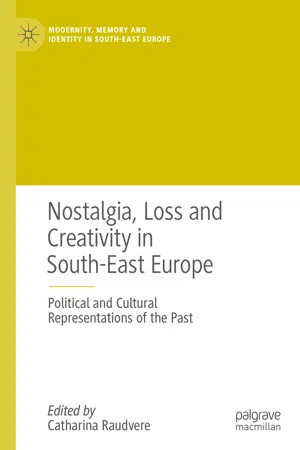
Nostalgia, Loss and Creativity in South-East Europe
Political and Cultural Representations of the Past
- English
- ePUB (mobile friendly)
- Available on iOS & Android
Nostalgia, Loss and Creativity in South-East Europe
Political and Cultural Representations of the Past
About This Book
Where nostalgia was once dismissed a wistful dream of a never-never land, the academic focus has shifted to how pieces of the past are assembled as the elements in alternative political thinking as well as in artistic expression. The creative use of the past points to the complexities of the conceptualization of nostalgia, while entering areas where the humanities meet the art world and commerce. This collection of essays shows how this bond is politically and socially visible on different levels, from states to local communities, along with creative developments in art, literature and religious practice. Bringing together scholars from a range of disciplines, the book offers analyses from diverse theoretical perspectives, united by an interest in the political and cultural representations of the past in South-East Europe from a long-term perspective. By emphasising how the relationship between loss and creative inspiration are intertwined in cultural production and history writing, these essays cover themes across South-East Europe and provide an insight into how specific agents – intellectuals, politicians, artists – have represented the past and have looked towards the future.
Frequently asked questions
Information
Table of contents
- Cover
- Front Matter
- 1. Loss and Creativity: Affect and Effect. Political and Cultural Representations of the Past in South-East Europe
- 2. Transforming a Totalitarian Edifice: Artistic and Ethnographic Engagements with the House of the People in Bucharest
- 3. Battles of Nostalgic Proportion: The Transformations of Islam-as-Historical-Force in Western Balkan Reconstitutions of the Past
- 4. The Economy of Nostalgia: Communist Pathos Between Politics and Advertisement
- 5. ‘Everything Has Its Place in God’s Imaret’: Nostalgic Visions of Co-existence in Contemporary Greek Historical Fiction
- 6. “This Is a Country for You”: Yugonostalgia and Antinationalism in the Rock-Music Culture of Bosnia and Herzegovina
- 7. Domesticating Kemalism: Conflicting Muslim Narratives About Turkey in Interwar Yugoslavia
- 8. Writing for Survival: Letters of Sarajevo Jews Before Their Liquidation During World War II
- 9. Enduring Bonds of Place: Personhood and the Loss of Home
- Back Matter